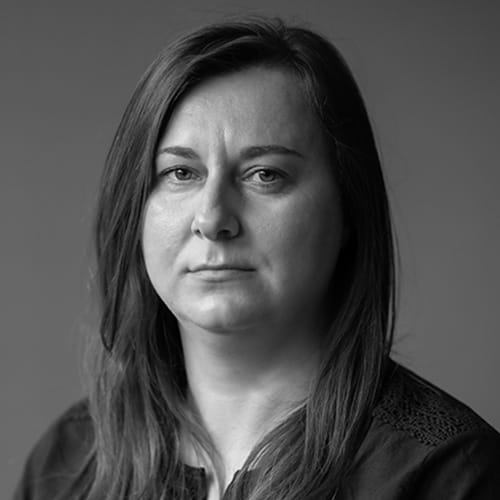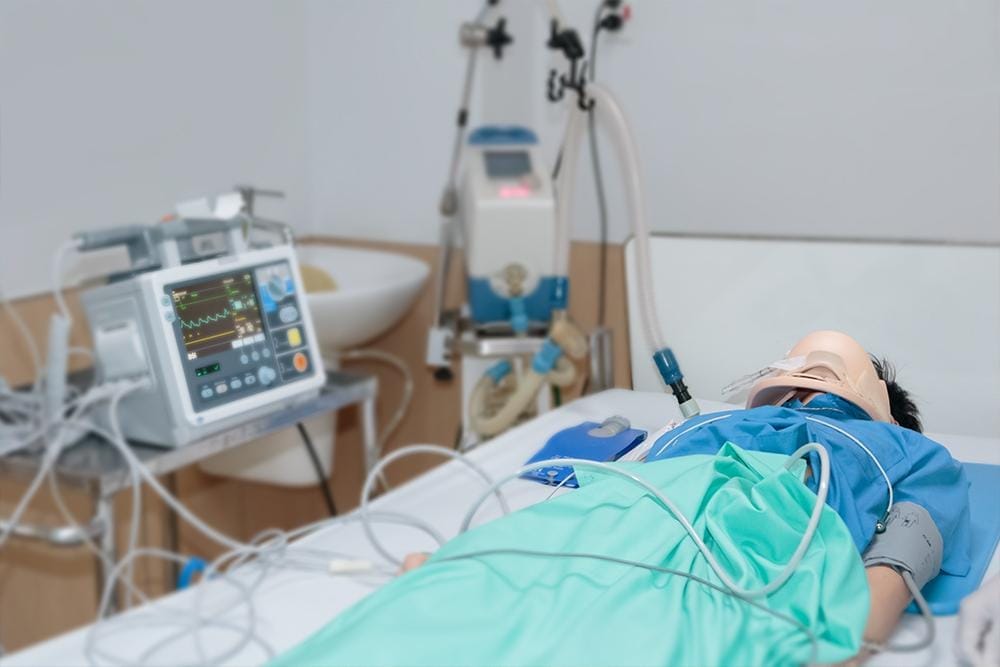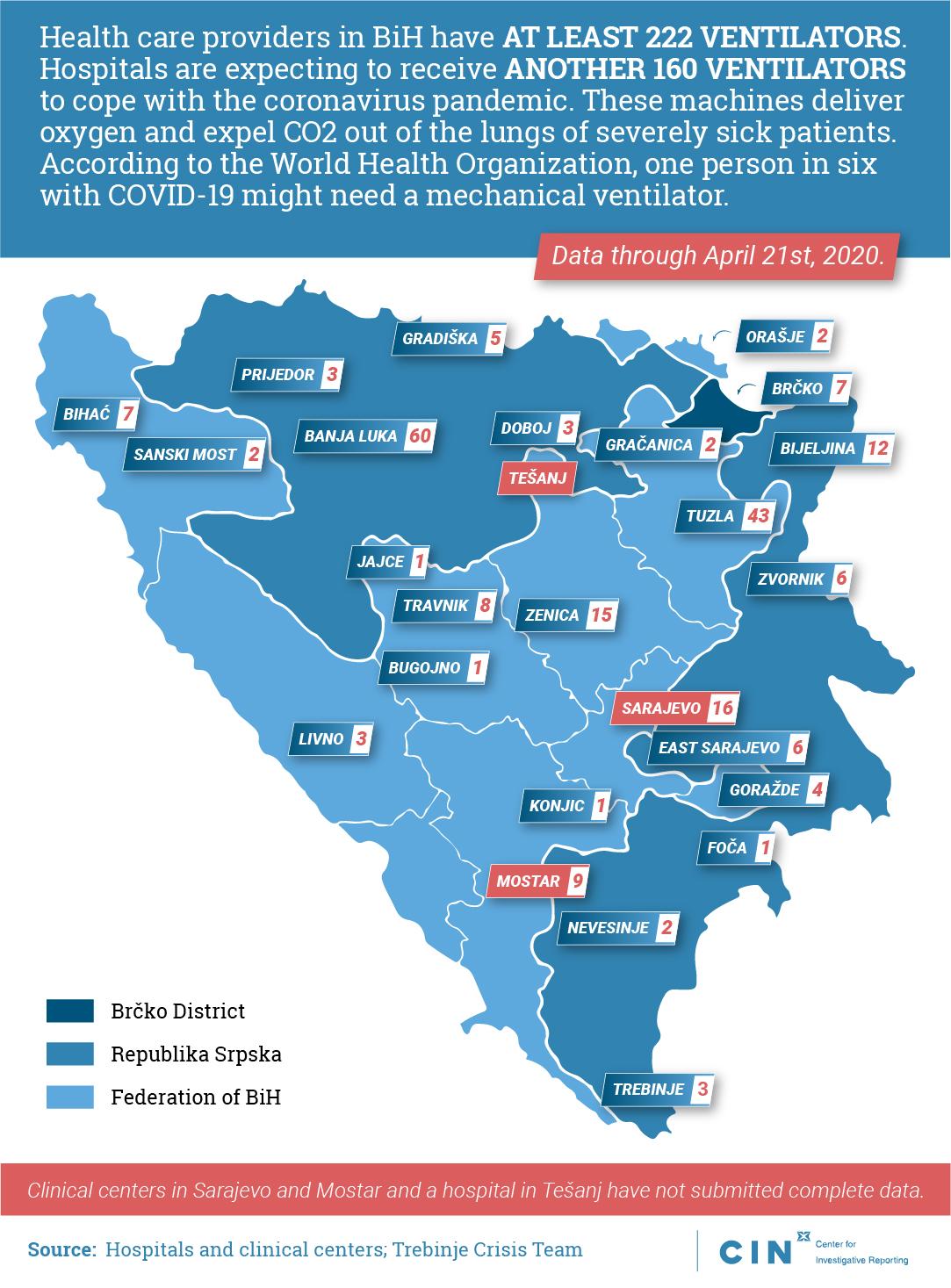Twelve ventilators are breathing instead of the lungs of severely sick patients with COVID-19 in clinical centers in Mostar and Banja Luka.
These machines help deliver oxygen and expel CO2 to patients so sick that they cannot breathe without assistance. According to the World Health Organization, one person in six with COVID-19 might need a mechanical ventilator for support.
According to regulations of the Institute for Metrology of Bosnia and Herzegovina (BiH), ventilators and similar medical equipment need to pass a conformity assessment at least once a year. It is a technical and safety inspection of the machines during which the apparatus’s technical parameters are tested.
Contracts with health care providers went to a Sarajevo-based “VERLAB” and a Banja Luka-based “METROLAB”. However, some hospital managers don’t think that the conformity assessment is needed and they consequently fail to go ahead with it, despite the legal obligation to do so.
According to the records collected by the Center for Investigative Reporting in Sarajevo (CIN), there are at least 222 ventilators in BiH hospitals and clinics. Last year, authorized repair service companies certified 153 ventilators after conducting conformity assessments. Due to the coronavirus pandemic, at least another 160 machines are expected to come to the aid of healthcare providers.
Health care managers are fretting that there might not be sufficient staff to man the machines due to the chronic lack of health care workers.
Untested Ventilators
As this story goes to print, there are more than 1,500 people sick with COVID-19 in BiH. Around 200 were treated in hospitals and among those, 12 were on ventilators in hospitals in Banja Luka and Mostar. At the Mostar University Clinical Hospital, five people were connected to breathing machines, none of which had been tested to ensure adherence to regulatory standards.
Hospital officials in Mostar didn’t want to disclose how many ventilators they had.
“For the time being we’re able to meet the demand,” said the Head of the Department of Anesthesia, Perioperative and Critical Care, Zoran Karlović.
Hospital officials further maintain that their machines are valid and regularly serviced by authorized repair dealers which don’t let anyone else “touch their equipment”.
“VERLAB”’s director, Almir Badnjević, says that servicing and conformity assessment are distinct procedures. He explains that during the assessment, all of the ventilators’ parameters are checked to see if they adhere to standards, as faulty machines can cause brain and lung damage, even death, if the exchange of gases is not conducted according to the standards. “At the moment it’s one of the most dangerous machines out there”, said Badnjević.
At the Sarajevo General Hospital conformity assessments are done every year and its administrators considered these as a way for staff to ensure “confidence in their further work”. Still, they say that during regular servicing all the parameters are checked anyway which begs the question if the conformity assessment is really necessary. “Thus, we pay for the same procedure twice – both for maintenance and a conformity assessment”, wrote the hospital administrators in a letter to CIN.
Apart from the Mostar Hospital, another 23 hospitals in BiH have not conducted conformity assessments of their ventilators. The Croat hospital in Nova Bila and the University Clinical Center in Tuzla officials agree with their Mostar colleagues that there is no need for conformity assessments. These two hospitals have conducted conformity assessments for only half of their 48 devices.
When reporters told Tuzla Hospital’s Director Vahid Jusufović that this was a legal requirement he answered: “The law requires all sorts of things, but we cannot necessarily comply with all of them.”
Noncompliance carries fines of up to 20,000 KM for institutions and up to 1,200 for heads of institutions. The State and Entity Metrology Institutes are in charge of oversight of implementation of the relevant legal regulations, while entity inspectors are charged with enforcement.
Officials from the Republika Srpska Institute for Standardization and Metrology are against these provisions.
“There is no need to assess the conformity of ventilators,” said its director Nikola Đukić. He told CIN that the State Institute has adopted this decision unilaterally, without the approval of other metrology regulators. In his opinion this was done to funnel money out of health care.
According to an analysis done by officials at the University Clinical Hospital in Mostar, health care providers have around 4,500 medical devices that should be assessed to ensure their adherence to regulatory standards. With the minimal price of an assessment ranging from 160 KM to 360 KM, depending on the device, the market value for such assessments is worth nearly 1 million KM.
“In our opinion, this is a complete waste of money,” said Đukić.
The Director of the State Metrology Institute, Zijad Džemić, said that such attitudes and the lack of sanctions means that a legal requirement has been reduced to the good will of health care managers.
“Still, the owners of equipment — for their conscientiousness and a desire to make sure that they work with accurate devices — have been collaborating with us.”
Recently, “VERLAB” has been notifying hospitals to remind them of the mandatory conformity assessment because “all sorts of medical equipment have been coming in untested and without known provenance,” and warning them “that they shouldn’t put their patients’ lives in danger.”
“All sorts started entering without being tested,” said Badnjević.
Due to the coronavirus pandemic, hospitals, public health institutions and their donors are expecting new ventilators. According to records CIN has collected, at least 160 ventilators are expected to come as donations or procurement for 13 hospitals.
The Director of General Hospital in Sarajevo, Zlatko Kravić, is unsure how many of the planned ventilators will be possible to buy. Already, the hospital got back money wired for five ventilators because supply companies couldn’t deliver them as borders shut down.
Kravić also said that medical equipment has become more expensive. “I used to put out tenders for ventilators,” said Kravić. “For example, Chinese ones, which used to cost between 30,000 KM and 32,000 KM, do you know for how much they’re going now? 75,000 KM.”
A retired doctor, Dragan Stevanović, said that along with the regular maintenance, it is important to conduct conformity assessments, which brings additional benefits both for the patients and for the staff.
However, he believes that the COVID-19 situation has rendered these assessments irrelevant for the time being. “As if now someone will dare say how they won’t use it because it’s not certified…well, what gives me the right to deny a patient (that care)?” said Stevanović. “My duty is to try to provide any help at my disposal at a given moment”.
He said that if a device is operated by a qualified person, then it will not be dangerous for patients, even if it has not passed a conformity assessment.
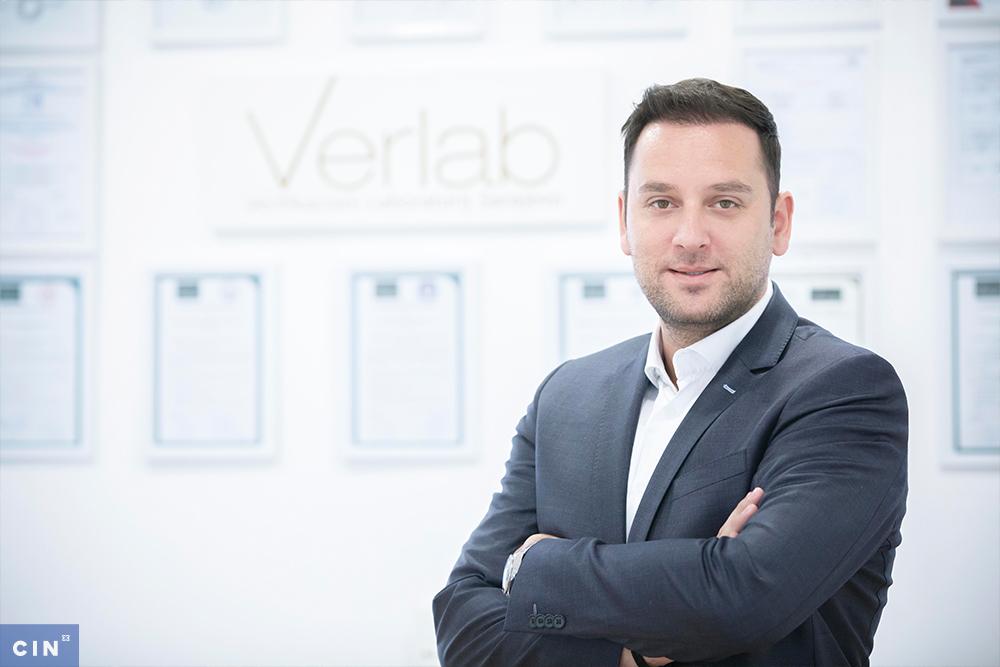
Lack of Qualified Personnel
Officials at the Healthcare Center in Brčko have not assessed the conformity of a ventilator they received through a donation. “Well, there’s no time,” explained Director Dušan Stokić, even though it typically takes only an hour for the assessment. He’s more worried if he’ll have staff able to use these machines.
“We have five anesthesiologists. Two doctors refused to work with these patients, and three remained. (…) My take on it is that whoever doesn’t have adequate protection cannot be forced to work, and I will not send them to work with those patients.” said Stokić
In his opinion the issue of the lack of medical staff should be solved by mandatory work duty for medical staff. Epidemiologist Jurica Arapović from the Mostar Clinic agrees. He said that all healthcare workers should be mobilized. “Why wouldn’t a GP become an epidemiologist in such a crisis situation, when there’s just one thing for them to do: track down contacts; send them into isolation and provide them with medical treatment,” Arapović told CIN.
The Independent Union of Health Care Workers in FBiH warned that there is a lack of medical staff on the market. The Union’s President, Zijad Latifović, said that in comparison with the European standard, currently there’s a dearth of 2,500 doctors and 4,500 nurses. In the past three years, more than 6,000 medical workers have left the FBiH alone.
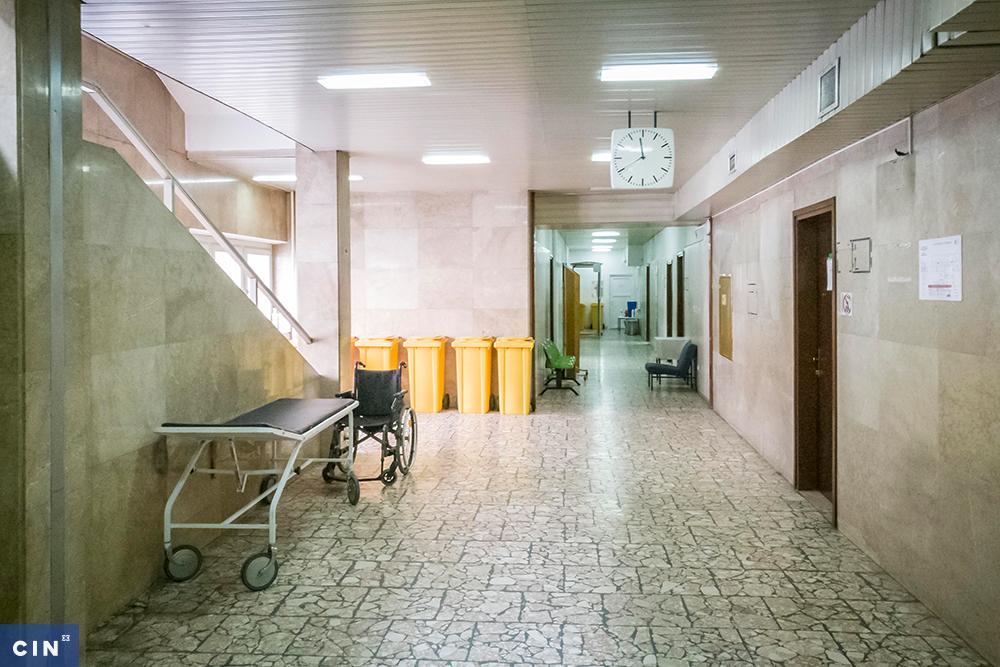
Medical Treatment at Home
However, not all COVID-19 patients are treated in hospitals. Nearly one in seven people in BiH who came down with the coronavirus infection is treated in the hospital, while others remain at home or in isolation facilities.
While officials have tried to lead the public to believe that most of the patients do not require hospital treatment, members of at least three families in Sarajevo have spoken out about why this type of treatment failed their loved ones who died from COVID-19 after belatedly being admitted to the hospital, or while they were waiting to obtain admission to a medical facility.
Advija Kanlić from Ilidža is one of the deceased. Her daughter Ehlimana told CIN that she was treating her mother at home with antibiotics and anti-inflammatory drugs, upon the recommendation from the local outpatient clinic, but to no avail.
Eventually, the local health care clinic sent a vehicle to pick her mother up after Kanlić had convinced the medical staff that her mother was so weak she could not stand. With the neighbor’s help, she managed to move her mother down the stairs to the vehicle in which there was only a driver, with no medical staff.
Kanlić describes her agony on the drive to the health care clinic. “After I realized she had no pulse I knocked on that little window saying ‘mom is not breathing’ and I started to scream, to cry…” says Kanlić. “Fearfully I started to massage her heart. I didn’t know what to do. He said ‘I cannot help you dear, I’m just a driver.”
The Cantonal Prosecutor’s Office in Sarajevo has been looking into the circumstances of the death of Advija Kanlić. Prosecutors and the family are requesting an autopsy in the interest of the investigation. However, the coroners in FBiH are refusing to do this because they don’t have safety gear. The body of the deceased has been resting in the local morgue for the past month.




